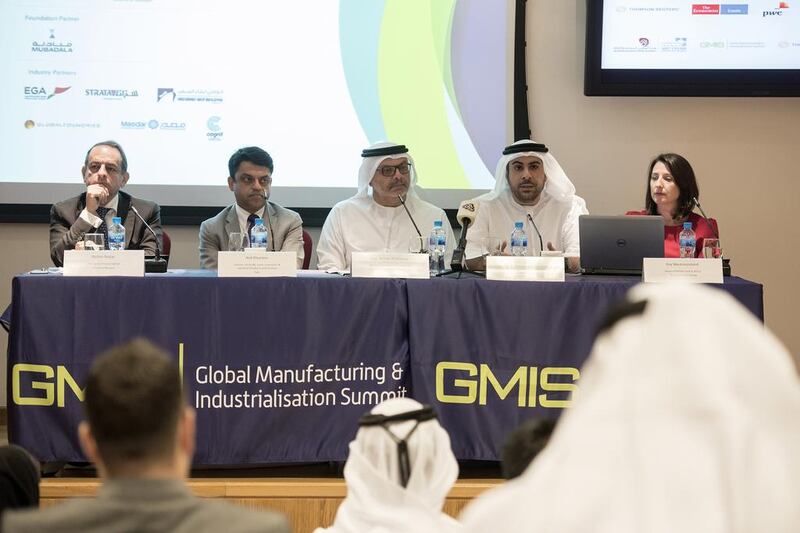Abu Dhabi plans to unveil the next phase of its industrial strategy to coincide with the first global manufacturing summit in March.
The Government is hosting the summit with the United Nations Industrial Development Organisation (Unido) at the Sorbonne campus in the capital.
“The 2016-20 strategy will be all about enabling the private sector, about linking the larger industries with the smaller and medium-sized companies,” said Ayman Al Makawi, the director general of Abu Dhabi’s Industrial Development Bureau, part of the Department of Economic Development (DED).
“We see the GMIS [Global Manufacturing and Industrialisation Summit] as a great platform and a perfect opportunity to set out that road map,” Mr Al Makawi said.
The Abu Dhabi Government has prioritised development of the small and medium-sized enterprise (SME) sector as part of its economic diversification and growth strategy, hoping to encourage entrepreneurship and innovation with a boost coming from contracts with large state-owned companies not only in hydrocarbons-related sectors but other priority “knowledge” sectors, such as aircraft manufacturing.
Last month, the DED showcased business links between state-owned industries, such as Emirates Global Aluminium and Emirates Steel Industries, and the private sector to highlight opportunities for growth and innovation for SMEs.
In May, Abu Dhabi set a target to double the size of its industrial base to 10 per cent of GDP, part of a broader strategy to increase the non-oil private sector’s share of GDP from 27 per cent to 40 per cent by 2030.
The GMIS was announced in June last year and it has been a platform for Abu Dhabi to promote not only the event but also Abu Dhabi itself as an emerging regional industrial hub, to potential investors.
“We have done roadshows for the event in the US, UK and France and it has allowed us to showcase opportunities in [Khalifa Industrial Zone Abu Dhabi] and other free zones in Abu Dhabi,” said Badr Al Olama, the chief executive of the aircraft parts maker Strata and one of the GMIS organisers.
“We’re expecting about 1,200 at GMIS, equally split between private sector company representatives and those from government, NGOs and supranational bodies, like Unido,” Mr Al Olama said.
The GMIS organisers also said yesterday that The Economist Group would be in charge of the event’s content.
Kay Westmoreland, the regional head of The Economist Group, said the event would seek to have “a higher purpose” by linking the themes of Unido’s 17 sustainable development goals, which include climate change, education and other human development objectives with the agenda for the March 27-30 summit.
The core theme, however, will be the role of manufacturing in economic development and Mr Al Olama said he expects substantive initiatives in terms of public-private policy, as well as potential investment deals to result from the gathering.
Manufacturing accounts for about US$15 trillion globally – out of a total global economy of about $73tn, according to World Bank estimates – with only about $300 billion for the GCC countries, so there is plenty of scope for improvement, said Anil Khurana, a partner at PricewaterhouseCoopers, which also announced yesterday that is will be a partner at the summit.
Manufacturing is important, especially in developing countries, because of its multiplier effect, whereby $1 million of development in the manufacturing sector adds on average $1.3m to the economy because of the value it creates in other sectors, such as financial services, Mr Khurana said.
For Abu Dhabi and other oil-dependent economies looking to diversify, it is especially important to create an ecosystem conducive to innovation and entrepreneurship, and how that happens in a fast-moving digitally driven manufacturing world will be a major theme of the summit.
amcauley@thenational.ae
Follow The National's Business section on Twitter





